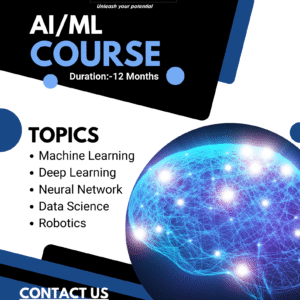- AI/ML is being used in every industry – healthcare, finance, marketing, etc.
- It offers high-paying and future-proof career options.
- It helps solve real-world problems – like fraud detection and disease prediction.
- It is a core technology for building smart systems and automation.
- It provides powerful tools to extract insights from data.
- It forms the foundation of advanced fields like Deep Learning, NLP, and Robotics.
- It has interdisciplinary applications – used in science, social science, and engineering.
- The field is fast-evolving – there are always new tools and techniques to learn.
“Artificial Intelligence (AI)” courses cover the principles and techniques that enable machines to mimic human intelligence. These courses typically explore topics like machine learning, deep learning, and generative AI, and often include hands-on projects and practical applications.
- 100% Free for Eligible Students & Teachers
- Placement assistance support
- Industry related certification
- Cloud Storage with OneDrive
- Seamless Collaboration for Group Projects
- Work Anywhere, Anytime
Course Duration
1 Year
Eligibility Criteria
10+2
Learning Mode
Offline/Online
Batches
Weekday/Weekend
Course Content
AI & mL Syllabus
Module 1: Introduction to AI and ML
What is AI?
AI vs ML vs Deep Learning
Applications of AI
History and evolution of AI
Overview of ML paradigms: Supervised, Unsupervised, Reinforcement Learning
Module 2: Python for AI/ML
Numpy, Pandas, Matplotlib
Scikit-learn basics
Data preprocessing and cleaning
Exploratory Data Analysis (EDA)
Module 3: Supervised Learning
Linear Regression
Logistic Regression
K-Nearest Neighbors (KNN)
Decision Trees and Random Forests
Support Vector Machines (SVM)
Model evaluation: Confusion Matrix, Precision, Recall, F1-Score, ROC
Module 4: Unsupervised Learning
Clustering: K-Means, Hierarchical Clustering, DBSCAN
Dimensionality Reduction: PCA, t-SNE
Anomaly Detection

Module 5: Natural Language Processing (NLP)
Text preprocessing (tokenization, stemming, etc.)
Bag of Words, TF-IDF
Word embeddings (Word2Vec, GloVe)
Sequence models (RNNs, LSTMs, Transformers – intro)
Sentiment analysis, Text classification
Module 6: Model Deployment and Production
Saving and loading models
Model serving (Flask, FastAPI)
Using cloud platforms (AWS, GCP, or Azure)
Basics of MLOps (CI/CD, model monitoring)
Module 7: Ethics and Bias in AI
AI fairness and bias
Explainable AI (XAI)
Data privacy
Real-world case studies
Key Features Of Course
Comprehensive Curriculum
Hands-On Practical Training
Flexible Learning Options
Expert Faculty
Updated Software Access
Certification
Career Support
Interactive Classrooms
Why Learn AI/ML
Certifications
Upon successful completion of the Microsoft Office course at Aptech Laketown, you will receive a recognized certificate that validates your skills and proficiency in Microsoft Office applications such as Word, Excel, PowerPoint, and Outlook.
This certificate serves as a valuable credential to:
Enhance your resume and job prospects
Demonstrate your expertise to academic institutions or employers
Boost your confidence in using Microsoft Office tools for professional and personal tasks
Our certification reflects the comprehensive training and practical experience gained during the course, ensuring you are well-prepared to meet real-world challenges.
FAQS
1. What is the difference between AI and ML?
AI (Artificial Intelligence) is the broader concept of machines being able to carry out tasks in a smart way. ML (Machine Learning) is a subset of AI that allows machines to learn from data and improve automatically without being explicitly programmed.
2. Do I need to know programming to learn AI/ML?
Yes, basic programming knowledge (especially in Python) is essential for practical implementation of ML algorithms and AI models.
3. What math is required for AI/ML?
You should be comfortable with linear algebra, calculus, probability, and statistics. These are foundational for understanding how ML models work.
4. What tools or libraries are used in AI/ML?
Popular tools include Python, Scikit-learn, TensorFlow, PyTorch, Keras, Pandas, NumPy, and Matplotlib.
5. Is AI/ML only for tech companies?
No. AI/ML is used in healthcare, finance, retail, agriculture, education, automobiles, and more. It’s a cross-industry skill.
6. How long does it take to learn AI/ML?
It depends on your background. A beginner might take 4–6 months of consistent study to become job-ready for entry-level roles or projects.
7. Can I learn AI/ML without a degree?
Yes! Many professionals are self-taught through online courses, bootcamps, and hands-on projects. A degree helps, but it’s not mandatory if you build a strong portfolio.
8. What are common real-world applications of AI/ML?
Recommendation systems (YouTube, Netflix)
Voice assistants (Siri, Alexa)
Image and speech recognition
Fraud detection in banking
Medical diagnosis
Self-driving cars
9. What’s the future of AI/ML?
AI/ML will continue to grow and power innovations in robotics, automation, personalized medicine, smart cities, and even creative industries like art and music.

